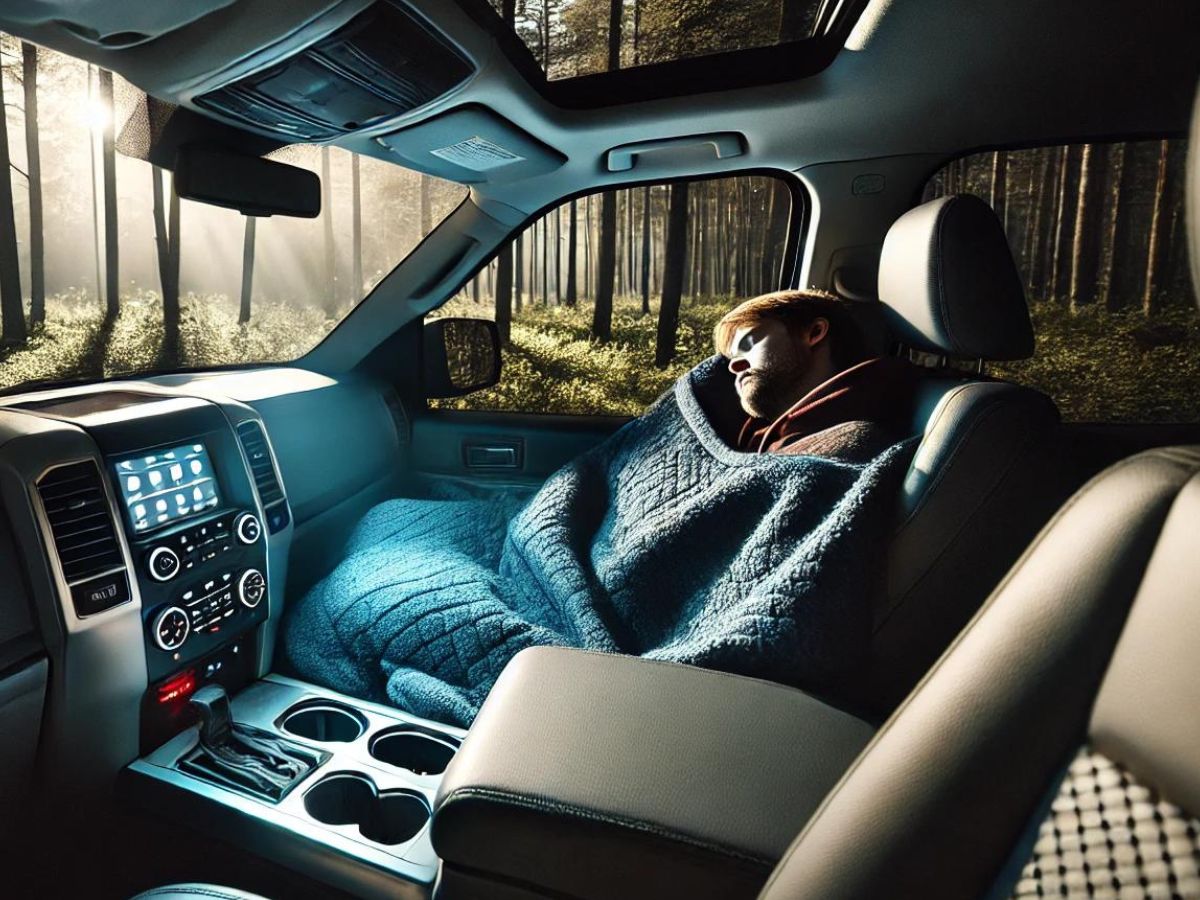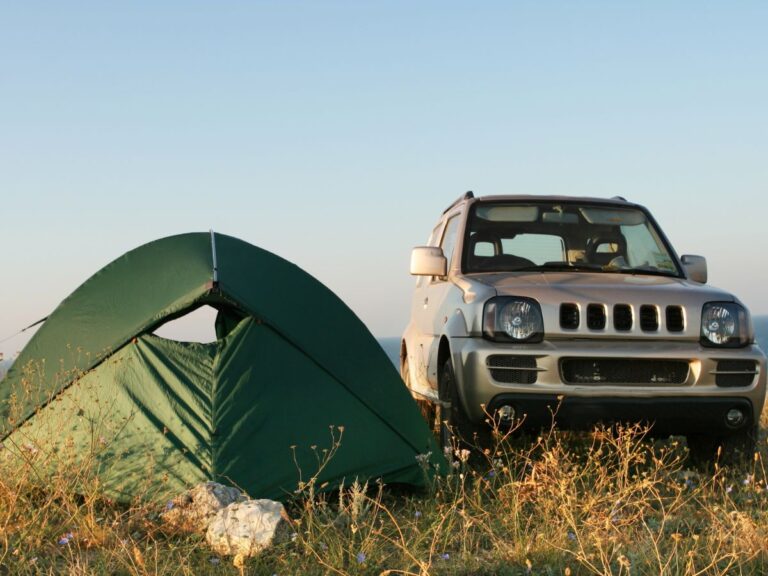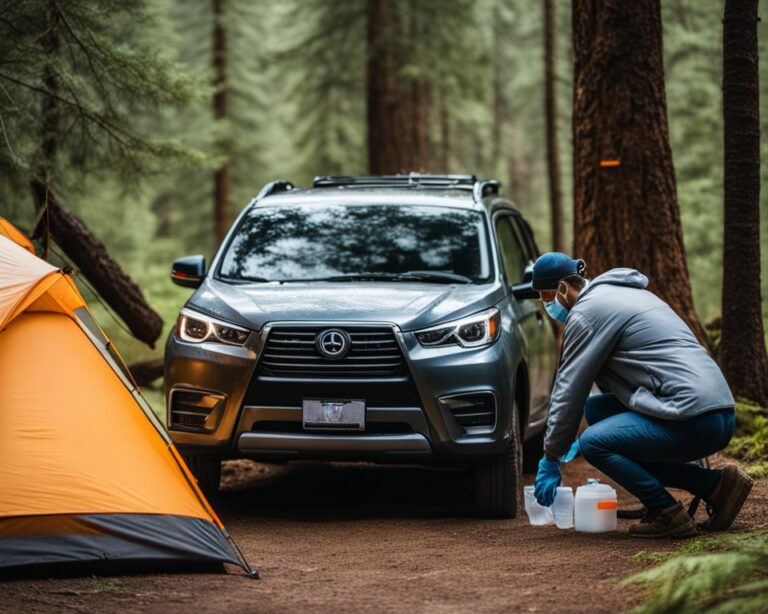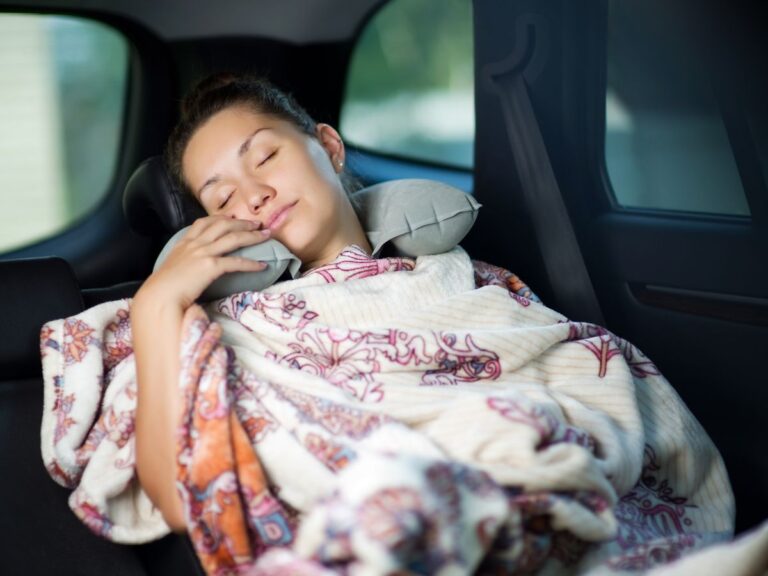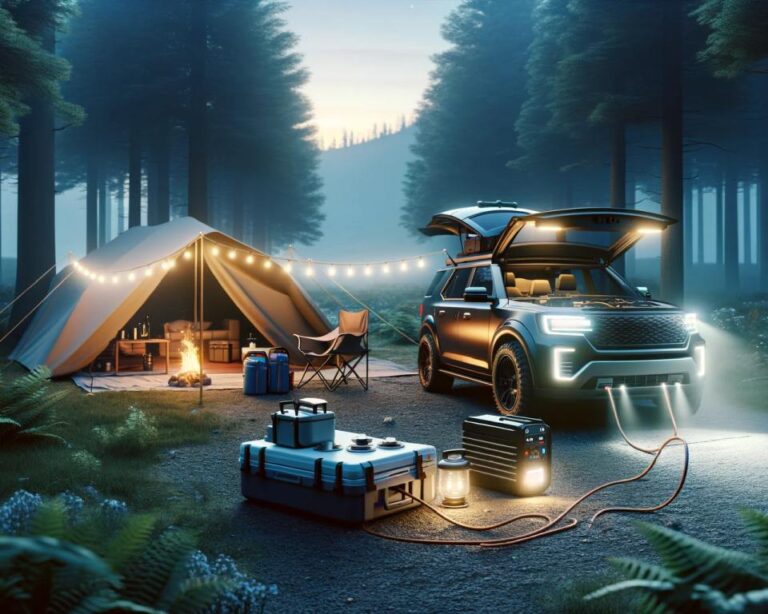Safely Sleeping in Your Car Overnight: A Comprehensive Guide
When sleeping in your car overnight, prioritize safety by choosing well-lit, designated parking areas and using locking mechanisms for security. Utilize opaque window coverings and hidden compartments to guarantee privacy and protect your belongings. Set up comfortably with foam padding and warm bedding for a good night’s sleep. Adapt to weather conditions with insulation or cooling methods. Manage noise with soundproofing techniques and maintain hygiene for a clean space. Be prepared for emergencies with necessary tools and contacts. Follow local regulations and create a restful routine. Make sure you’re ready for a peaceful night and a smooth morning ahead.
Finding a Safe Parking Spot
Where should you park your car overnight to guarantee safety and minimize potential risks? When it comes to finding a safe parking spot for sleeping in your car, there are several key factors to take into account. Initially, adhere to parking etiquette by choosing designated parking areas such as rest stops, campgrounds, or well-lit parking lots. Avoid parking in secluded or prohibited areas, as this can increase the likelihood of unwanted attention or encounters. To find the best resources for safe parking, consider using apps like iOverlander, which provide information on free and paid camping spots, or websites like ParkSleepFly.com, which offer hotel parking packages allowing you to park in a secure lot while staying at the hotel. Additionally, contacting local authorities or visitor centers can provide valuable insights on safe parking locations in the area. By following these guidelines and utilizing available resources, you can guarantee a secure and peaceful overnight stay in your car.
Securing Your Belongings
When sleeping in your car overnight, it is important to secure your belongings to prevent theft and guarantee your peace of mind. Utilize locking mechanisms to safeguard your valuables. Make sure all doors are locked, including the trunk. Consider investing in a steering wheel lock to deter potential thieves. Place important documents and valuable items out of sight, preferably in a locked glove compartment or hidden storage space. Avoid leaving items on display that may tempt burglars. Additionally, if your car has an alarm system, activate it before settling in for the night. Park in well-lit areas or within view of security cameras to enhance theft prevention measures. Remember to secure electronic devices such as laptops and phones in a locked bag or container. Implementing these theft prevention strategies will help you rest easier knowing your belongings are safe and secure while you sleep in your car.
Ensuring Privacy and Security
To guarantee privacy and security when sleeping in your car overnight, consider using privacy window coverings to block out light and prying eyes. Opt for secure parking locations that are well-lit and frequented by others for added safety. Additionally, organize your car’s interior in a way that keeps valuables out of sight and easily accessible in case of emergencies.
Privacy Window Coverings
Consider utilizing opaque window coverings to maximize privacy and security when sleeping in your car overnight. Customized solutions offer the ability to tailor the coverings to fit your specific vehicle windows perfectly. DIY options can range from simple curtains made from blackout fabric to more complex installations using blackout window films.
When choosing window coverings, it is crucial to think about whether you prefer temporary or permanent solutions. Temporary options such as suction cup blackout curtains provide flexibility and ease of installation, allowing you to remove them during the day. On the other hand, permanent coverings like custom-cut blackout window films offer a more secure and integrated solution for long-term use.
Opting for opaque window coverings not only ensures privacy by blocking the view from the outside but also enhances security by concealing valuable items inside your vehicle. By carefully selecting the right type of window coverings based on your preferences and needs, you can create a safe and private sleeping environment in your car.
Secure Parking Locations
For optimum privacy and security when sleeping in your car overnight, identifying secure parking locations is essential to guarantee a safe and undisturbed rest. When seeking a suitable spot, consider the following:
- Parking Etiquette: Choose designated overnight parking areas such as rest stops, campgrounds, or well-lit public spaces. Avoid parking in residential areas or private property without permission to prevent disturbances or legal issues.
- Vehicle Security: Opt for spots with good lighting and visibility to deter potential threats. Park near security cameras or within sight of security personnel if possible. Utilize steering wheel locks or alarms for added protection.
Ensuring you adhere to parking regulations and respect the environment will not only provide a secure sleeping location but also contribute to a positive experience for both yourself and the community. By prioritizing these factors, you can enhance your safety and peace of mind while resting in your car overnight.
Interior Organization Tips
Identifying secure parking locations is a key step, now let’s focus on optimizing the interior organization of your car to guarantee both privacy and security while sleeping overnight. Maximizing space within your vehicle is essential for a comfortable rest. Start by organizing essentials in a way that is easily accessible but not in plain sight from outside. Use storage containers or organizers to keep items tidy and prevent them from shifting while driving or sleeping. Consider installing window shades or curtains to block the view from outside, adding an extra layer of privacy.
Secure valuable items in hidden compartments or lockboxes within your car. Avoid leaving personal documents, electronics, or cash in plain sight. Utilize the trunk space for storing larger items that are not needed during the night. Keep a small bag with essentials like water, snacks, a flashlight, and a first aid kit within reach. By strategically organizing your belongings, you create a safer and more comfortable environment when sleeping in your car.
Setting Up for Comfort
To ensure a comfortable rest while sleeping in your car overnight, prioritize creating a supportive and level sleeping surface. This is essential for preventing discomfort and ensuring a good night’s sleep. Here are some essential tips for setting up for comfort:
- Comfort Essentials:
- Use foam padding or an air mattress: These can provide cushioning and support to help alleviate pressure points.
- Consider a sleeping bag or blankets: Adding layers can enhance warmth and comfort.
- Use pillows strategically: Position them to support your neck and back in various sleeping positions.
When setting up your sleeping space, take into account different sleeping positions. Depending on what’s most comfortable for you, try adjusting the seat incline, using cushions for support, or laying the back seats flat. Experiment with these options to find the most suitable position that promotes restful sleep while ensuring your safety and comfort.
Staying Warm in Cold Weather
To stay warm in cold weather while sleeping in your car, consider insulating your vehicle using materials like thermal blankets or foam pads to trap heat. Utilize warm bedding such as sleeping bags rated for low temperatures and extra blankets to create layers of warmth. Additionally, explore portable heating options like electric blankets, heated mattress pads, or safe-to-use camping heaters to maintain a comfortable temperature inside your car.
Insulating Your Vehicle
When insulating your vehicle for overnight stays in cold weather, consider using materials that provide effective heat retention and insulation. Insulating your car properly can greatly improve your comfort and safety during the night. Here are some key points to keep in mind:
- Insulating Materials: Opt for insulating materials like foam boards, reflective blankets, or thermal curtains to trap heat inside the vehicle.
- Techniques: Guarantee that all windows and doors are properly sealed to prevent drafts. Use weather stripping to seal gaps and cracks.
- Temperature Control Strategies: Utilize portable heaters designed for indoor use to safely warm up the interior of your car.
Using Warm Bedding
Consider selecting bedding materials with high thermal properties to effectively retain body heat and guarantee warmth during cold weather nights. When choosing bedding options for staying warm in your car, prioritize materials like wool or fleece blankets, which offer excellent insulation. These cozy blankets are essential for trapping heat close to your body and maintaining a comfortable temperature inside your sleeping area.
To enhance temperature control, layer your bedding with a combination of sheets, blankets, and a sleeping bag if needed. Start with a moisture-wicking sheet to keep sweat at bay and add a thick, insulating blanket on top. You can then adjust the layers based on the temperature, adding or removing blankets to regulate your warmth throughout the night.
Remember that comfort is key for a restful sleep, so make sure your bedding is not only warm but also soft and pleasant to the touch. By carefully selecting your bedding materials and layering them strategically, you can create a cozy and inviting sleeping environment inside your car, even in the chilliest of nights.
Portable Heating Options
Explore various portable heating options to effectively maintain warmth during cold weather nights while sleeping in your car. When winter camping or faced with chilly temperatures, having the right heating solution is essential for a comfortable and safe experience. Consider the following options:
- Portable Electric Heaters: These are convenient and easy to use, providing instant heat. However, they require a power source, which might not be practical in remote locations.
- Portable Propane Heaters: Ideal for outdoor activities like winter camping, these heaters offer excellent heat output. Make sure proper ventilation to prevent carbon monoxide buildup.
- Heated Blankets or Sleeping Bags: Electric blankets or heated sleeping bags can be a cozy addition to your bedding, providing warmth throughout the night without the need for additional fuel.
When using portable stoves or any heating device in your car, always follow manufacturer instructions, keep ventilation in mind, and have a carbon monoxide detector for added safety. Stay warm and sleep soundly during cold nights with these portable heating options.
Staying Cool in Hot Weather
To regulate the temperature inside your car during hot weather, utilize sunshades on your windows and windshield to reduce the amount of heat entering your vehicle. This simple step can greatly lower the internal temperature, making it more comfortable for you to rest. Additionally, consider investing in window visors or tinting to further block out the sun’s rays. Ventilation is important in staying cool; crack open windows slightly to allow for airflow, but make sure they are not opened wide enough for unwanted intruders. Parking in shady areas or using a carport can also help maintain a cooler interior. Hydrating effectively is essential in hot weather, so always keep a sufficient amount of water in your vehicle. Consider using portable fans or battery-operated cooling devices to increase air circulation. Remember, staying cool in hot weather is not just about comfort but is also crucial for your health and safety while sleeping in your car.
Dealing With Noise and Light
Minimize disturbances from noise and light by utilizing blackout curtains or window covers to create a dark and quiet environment for better sleep quality while resting in your car. Soundproofing techniques can also be effective in reducing external noise. Here are some strategies to help you deal with noise and light:
- Soundproofing Techniques
- Use foam insulation or soundproofing mats on the doors and windows to reduce external noise.
- Seal any gaps or cracks in your car to prevent sound from entering.
- Light Blocking Solutions
- Invest in high-quality blackout curtains or shades to block out light effectively.
- Use a sleep mask to eliminate any remaining light that may disturb your sleep.
Bathroom and Hygiene Considerations
When sleeping in your car overnight, maintaining proper bathroom and hygiene considerations is crucial for your comfort and well-being. Make sure you have sufficient water availability for personal hygiene needs. Keeping wet wipes, hand sanitizer, and a small towel can help you stay clean. Opt for biodegradable hygiene products to minimize environmental impact.
For waste disposal, carry sealable bags for any trash, used hygiene products, or food waste. Dispose of these items properly in designated bins to keep your car clean and odor-free. If using disposable items like tissues or wipes, make sure to dispose of them responsibly.
To maintain cleanliness inside your car, regularly wipe down surfaces with disinfectant wipes. Keep a small dustpan and brush for easy cleanup of dirt or crumbs. Consider using odor-neutralizing products to keep your car smelling fresh.
Safety Measures and Emergency Preparedness
Maintaining safety measures and being prepared for emergencies while sleeping in your car overnight is paramount for your overall well-being and peace of mind. To guarantee your safety, consider the following:
- Emergency Contacts: Have a list of emergency contacts readily available in your car. Include numbers for local emergency services, family members, and friends who can assist you in case of an emergency.
- First Aid Kit: Keep a well-equipped first aid kit in your car. The kit should include essentials such as bandages, antiseptic wipes, gauze pads, adhesive tape, pain relievers, and any personal medications you may need.
- Emergency Tools: Equip your car with essential emergency tools such as a flashlight, a multi-tool, a reflective vest, and jumper cables. These tools can be essential in various emergency situations, from changing a flat tire to signaling for help in the dark.
Being prepared and having these safety measures in place can make a significant difference in handling emergencies effectively while sleeping in your car overnight.
Legal and Local Regulations
You should be aware of the laws regarding sleeping in your car, as regulations can vary by state and city. Understanding city ordinances is important to avoid any legal issues while resting in your vehicle overnight. Compliance with safety guidelines is vital to make sure you are following the law and staying safe during your stay.
Laws on Car Sleeping
Understanding the legal and local regulations regarding sleeping in your car overnight is essential for avoiding potential fines or legal issues. When it comes to car sleeping legality and vehicle occupancy laws, it’s important to be aware of the following points:
- Car Sleeping Legality:
- Different states have varying laws on sleeping in your car overnight. Some states allow it, while others restrict it to designated areas.
- Make sure to research the specific laws in the state or area where you plan to sleep in your car to avoid any legal consequences.
- Vehicle Occupancy Laws:
- Many jurisdictions have laws regulating how many people can occupy a vehicle at a given time, especially when it comes to sleeping in the car.
- Understanding these laws can help you guarantee compliance and avoid any fines or penalties for exceeding occupancy limits.
Being informed about the legal aspects of sleeping in your car can contribute to a safer and more pleasant experience during your overnight stays.
City Ordinances Overview
Researching city ordinances is essential for grasping the legal and local regulations governing sleeping in your car overnight. When it comes to noise restrictions, many cities have specific rules in place to prevent disturbances during nighttime hours. It is vital to familiarize yourself with these regulations to avoid potential fines or conflicts with the authorities.
Additionally, some cities require parking permits for overnight parking in certain areas. Make sure to check if you need a permit to park your car overnight to avoid any violations. Violating parking regulations can result in fines or even having your vehicle towed, causing unnecessary stress and inconvenience.
Safety Guidelines Compliance
To ensure compliance with safety guidelines regarding sleeping in your car overnight, it is essential to understand the legal and local regulations in place within the city where you plan to park. Failure to adhere to these regulations could result in fines or even legal repercussions. Here are some key points to keep in mind:
- Safety Equipment: Make sure your car is equipped with essential safety items such as a first aid kit, a fire extinguisher, and reflective warning triangles.
- Emergency Contacts: Keep a list of emergency contacts handy in case of any unforeseen situations. Include local emergency services numbers and numbers of trusted friends or family members.
- Local Regulations: Familiarize yourself with any specific rules or restrictions regarding overnight parking in the area. Some cities may have designated safe parking zones or prohibit sleeping in vehicles in certain areas.
Tips for a Good Night’s Sleep
Consider positioning your car on a level surface to guarantee a comfortable and restful night’s sleep. Sleep hygiene is essential for quality rest. Make sure your car windows are slightly cracked for ventilation, and use sunshades to block out excess light. Keep the interior clean and clutter-free to create a relaxing environment. Incorporate relaxation techniques such as deep breathing or gentle stretching before bed to unwind and signal to your body that it’s time to sleep. Utilize comfortable bedding, like sleeping bags or blankets, to promote a cozy atmosphere. Adjust your seat to a reclined position that supports your body well and reduces strain. It’s advisable to park in well-lit areas for safety and peace of mind. Finally, consider using earplugs or a white noise machine to minimize external disturbances. By following these tips, you can enhance your chances of a good night’s sleep while resting in your car.
Waking Up and Moving On
Upon awakening in your car, make sure you assess your surroundings for safety and plan your next steps accordingly. It’s crucial to start your morning routines in a safe and organized manner, especially when you have road trip plans ahead. Follow these key steps:
- Check your immediate surroundings: Look around to make certain there are no potential hazards or suspicious individuals nearby before stepping out of your vehicle.
- Prepare for the day: Organize your belongings and gear, ensuring everything is secure and in its place for a smooth start to the day.
- Review your road trip plans: Take a moment to revisit your itinerary, double-check your route, and assess any necessary stops or detours you might need to make along the way.
Ensuring a Safe and Comfortable Night’s Sleep in Your Car
To sum up, by following the guidelines outlined in this extensive guide, you can guarantee a safe and comfortable night’s sleep while sleeping in your car. From finding a secure parking spot to staying warm in cold weather, taking proper safety measures and being prepared for emergencies, you can rest assured that you are well-equipped for a successful overnight stay in your vehicle. Remember to always prioritize your safety and well-being while on the road.

